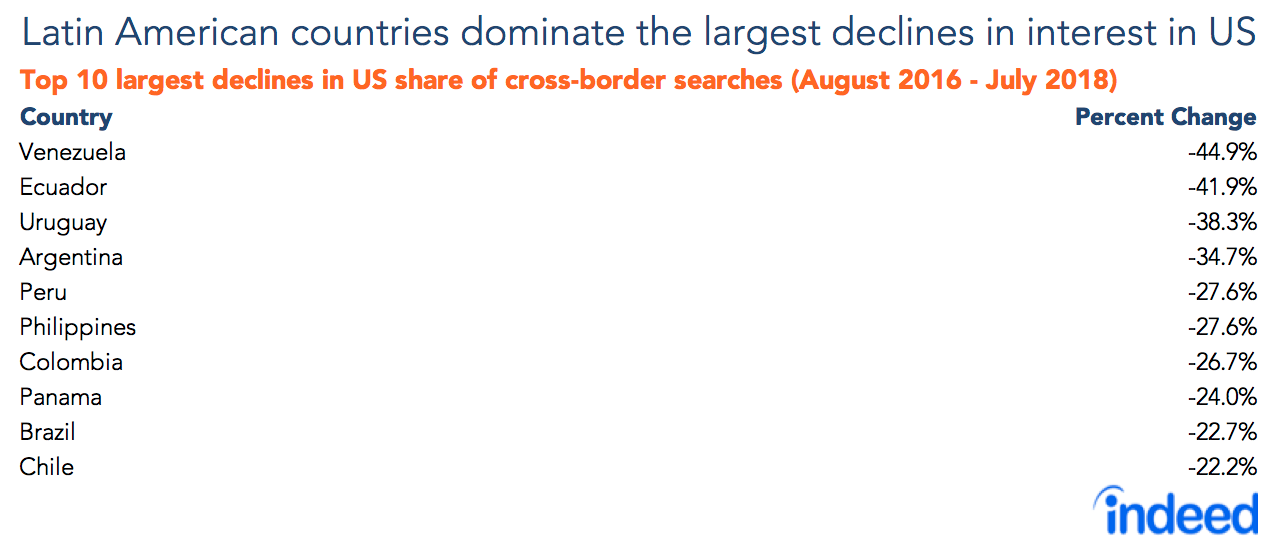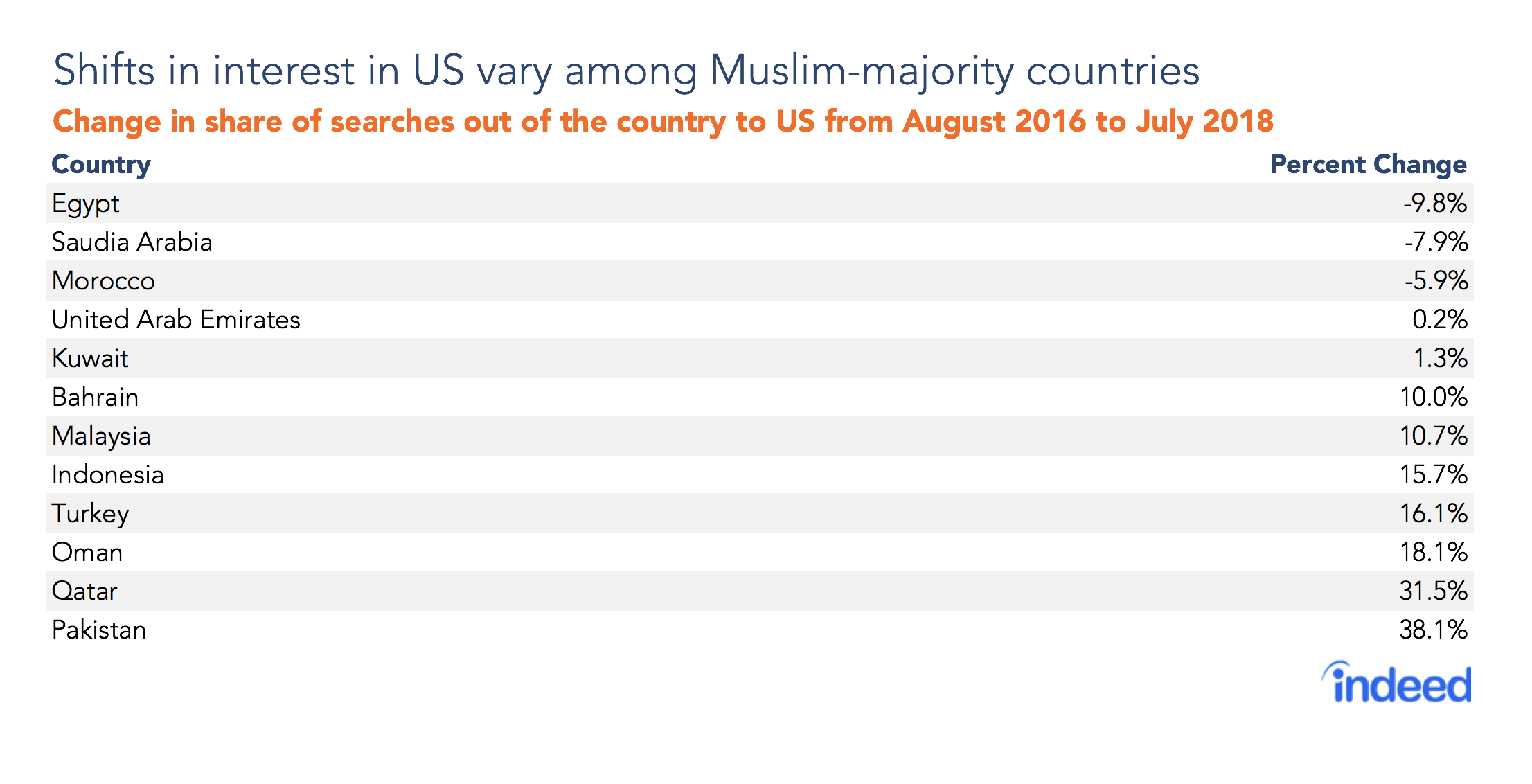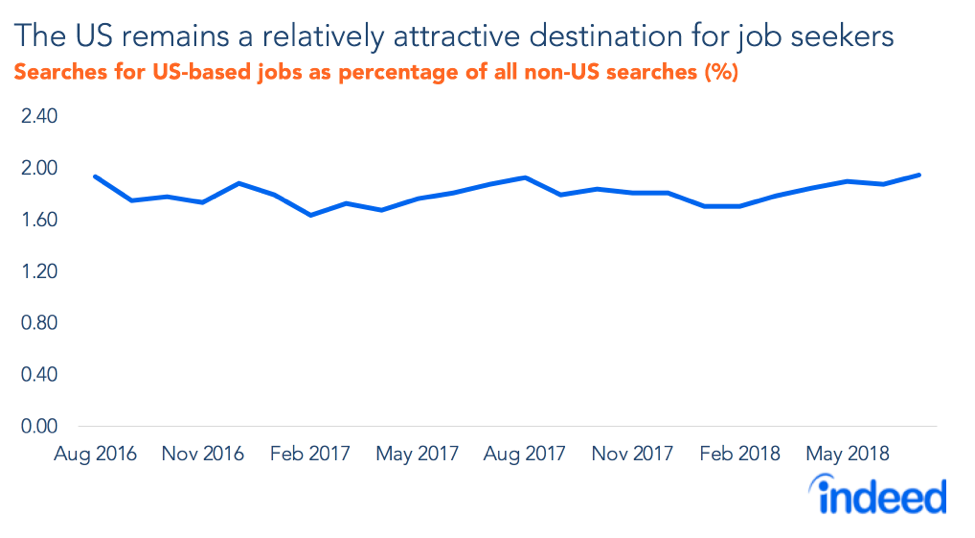In both rhetoric and policy, the Trump Administration has taken an anti-immigration stance. Has this shift discouraged international job seekers from looking for work in the US? Indeed job search data are a great source for gauging changes in interest in a variety of jobs. Looking at the data from August 2016, before the election of President Trump, to July 2018 shows the ways the attractiveness of US jobs to international job seekers has changed.
Latin American countries, and Mexico in particular, have borne the brunt of the administration’s sharp words and policy initiatives on immigration. And over this two-year period, job seekers from several Latin American countries have become less likely to search for US-based jobs when they look for work abroad.
What about another administration immigration target — residents of Muslim-majority countries? Interest in US jobs has risen dramatically from many Muslim-majority countries, such as Pakistan, though it has fallen from a few, such as Egypt. The reasons for these differences among Muslim-majority countries are unclear.
More broadly, international interest in US jobs remains fairly constant. Job seekers in other countries are about as likely to look for a US-based job now as they were in August 2016. This may be because the Trump Administration’s words and actions have focused on some countries and groups of potential immigrants more than on others. Alternatively, steady interest in US jobs may reflect the continued strengthening of the US labor market, creating a certain luster for international job seekers.
So while the US still appears to be an attractive destination for international job seekers overall, important differences are evident depending on where job seekers are searching from.
Job interest from Latin America countries is on the decline
Latin American countries are a case in point. These countries have been the chief target of the Trump Administration rhetoric on immigration and many of its policy actions. When job seekers from several Latin American countries look abroad for work, Indeed data show they are now less likely to search for a job in the US. Of the top 10 countries with the largest declines in interest to the US, nine are from Latin America (the Philippines is the exception). Mexico falls just outside the ten countries with the largest declines, with a 13.3% decline, the 12th largest. The timing of the drop in the share of cross-border searches going to the US is telling. For example, the downward trend for Colombia and Mexico started in late 2016 and early 2017, around the time of President Trump’s election and inauguration.

Interestingly, job seekers in these Latin American countries, with the exception of Panama, have become increasingly more likely to search abroad for work, but the US has become less attractive relative to other countries.
Interest in US jobs rises from some Muslim-majority countries
Muslim-majority countries have also been a regular target of the administration’s policy and rhetoric on immigration. But, as measured by search behavior, interest in the United States hasn’t moved in one clear direction. Notably, in several countries, it appears to be on the rise. Job seekers in Pakistan, Qatar, Turkey, Oman, Bahrain, Indonesia, and Malaysia looking for work abroad are now more likely to search for US-based jobs, but from other nations, such as Egypt and Saudi Arabia, job seeker interest in the US has fallen. To be sure, we have no data from the five Muslim-majority countries on the US travel ban list — Iran, Libya, Somalia, Syria, and Yemen. Still, it’s surprising that the US remains attractive to job seekers in many of the Muslim-majority countries with Indeed websites. Why interest has risen in so many of these countries is unclear, as is the source or sources of variation among the countries.

An area where interest in the US has actually increased is Europe. The share of cross-border searches going to the US has risen in a number of European countries such as Portugal, Poland, Hungary, Denmark, and Czechia — indicating that the US continues to be attractive to job seekers from that continent.
Overall international interest in US jobs remains steady
As international job seekers look for work, how likely are they to search in the US rather than other countries? In August 2016, roughly 1.9% of searches from outside the US were for US jobs. Searches for US-based jobs held stable over the intervening years and was at the same level in July 2018. Job seekers from outside the United States appear to be just as likely to look at the US now as they were in the recent past. The continued strengthening of the US labor market may be offsetting any reduction in interest in the United States, but the exact reasons for this steady trend aren’t evident.

In sum, overall interest in US-based jobs has changed little since August 2016 as the share of global job searches going to the United States has held steady. But trends for specific countries stand out. Job seekers from several Latin American countries have shifted away from the United States during this period. Surprisingly, interest from several Muslim-majority countries — though none included were on the travel ban list — has increased during this period. Keeping an eye on these trends will show how the potential supply of immigrants to the US changes, both overall and from specific countries.
Methodology
We examined the search behavior of Indeed job seekers from August 2016 to June 2018 in countries with an Indeed website in August 2016, with the exception of China. For the aggregate search figures, we define a cross-border search as one from a job seeker with an IP address outside the US in one of the 60 countries we study for a job on the US Indeed site. The global search number is total job searches from outside the US and from the 60 countries, regardless of the country the job is located in. For each country, a cross-border search is one in which the job seeker’s IP matches the home country, but the job is located in a different country. A cross-border search to the US is one with a job seeker IP address from the country and a job hosted on the US Indeed website.
The 60 markets included in this analysis are — in alphabetical order of IP code — the United Arab Emirates, Argentina, Austria, Australia, Belgium, Bahrain, Brazil, Canada, Switzerland, Chile, Colombia, Czechia, Germany, Denmark, Ecuador, Egypt, Spain, Finland, France, the United Kingdom, Greece, Hong Kong, Hungary, Indonesia, Ireland, Israel, India, Italy, Japan, South Korea, Kuwait, Luxembourg, Morocco, Mexico, Malaysia, Nigeria, the Netherlands, Norway, New Zealand, Oman, Panama, Peru, the Philippines, Pakistan, Poland, Portugal, Qatar, Romania, Russia, Saudi Arabia, Sweden, Singapore, Thailand, Turkey, Taiwan, Ukraine, Uruguay, Venezuela, Vietnam and South Africa.
